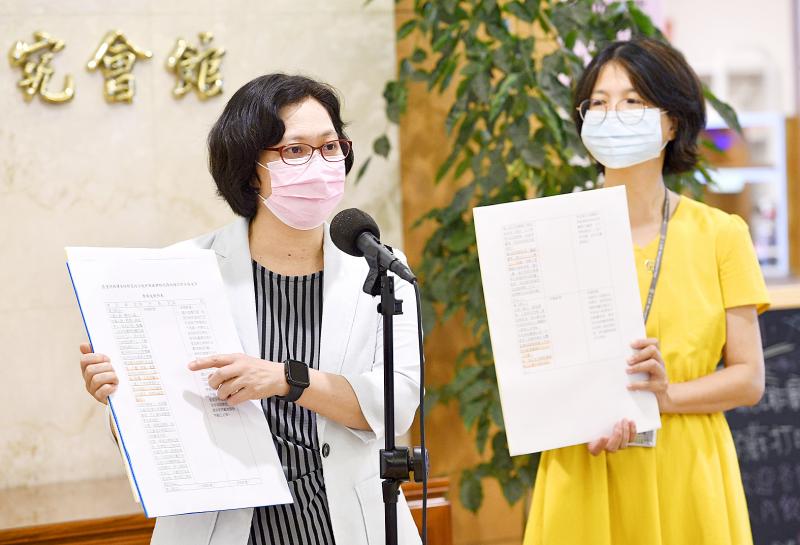Legislators across party lines yesterday proposed an amendment that would grant COVID-19 pandemic-related leave subsidies to parents, potentially totaling up to NT$10 billion (US$357 million).
The proposal would add a clause to the Special Act for Prevention, Relief and Revitalization Measures for Severe Pneumonia with Novel Pathogens (嚴重特殊傳染性肺炎防治及紓困振興特別條例), allowing workers who have to take unpaid leave to take care of their children who are younger than 12 or attending elementary school to apply for the subsidies.
The subsidy amount would be 60 percent of the recipients’ total insurance payouts for the previous year, estimated at NT$683 per day.

Photo: Lo Pei-der, Taipei Times
Many parents, especially low-income families, have been forced to take unpaid leave to care for their children during a nationwide COVID-19 outbreak in the past few days, Taiwan People’s Party (TPP) Legislator Lai Hsiang-ling (賴香伶) said.
Payment for leave in such situations is optional, as stipulated in Ministry of Labor regulations, said Lai, a labor rights advocate.
Some companies have refused to allow workers to take special paid leave for workers to take care of their children, and instead asked them to take a vacation leave, she said.
The companies’ requests contravene workers’ rights, Lai said, but added that many small and medium-sized firms could not afford to grant their workers special leave.
“It highlights the necessity of writing into law the rights of workers to take pandemic-related special leave bolstered by subsidy payments,” Lai said.
Since a level 3 COVID-19 alert was declared in Taipei and New Taipei City on Saturday last week, which was extended nationwide on Wednesday, more than 2.53 million children up to 12 years old are expected to stay home for two weeks, Lai said.
Considering that for each child one parent would have to stay home, and that a certain share of them would have to take special leave and apply for the subsidy, it is estimated that it would cost the government up to NT$10 billion, she said, adding that this amount was small, compared with the Executive Yuan’s special budget of NT$210 billion.
Lai said she hoped the amendment would be passed as soon as possible to help financially disadvantaged Taiwanese.
The bill, signed by 21 legislators across party lines, was sponsored by Lai, TPP Legislator Jang Chyi-lu (張其祿), Democratic Progressive Party Legislator Liu Chien-kuo (劉建國) and Chinese Nationalist Party (KMT) Legislator Yang Chiung-ying (楊瓊瓔).

Taiwan has received more than US$70 million in royalties as of the end of last year from developing the F-16V jet as countries worldwide purchase or upgrade to this popular model, government and military officials said on Saturday. Taiwan funded the development of the F-16V jet and ended up the sole investor as other countries withdrew from the program. Now the F-16V is increasingly popular and countries must pay Taiwan a percentage in royalties when they purchase new F-16V aircraft or upgrade older F-16 models. The next five years are expected to be the peak for these royalties, with Taiwan potentially earning

POSITIVE DEVELOPMENT: Japan and the US are expected to hold in-depth discussions on Taiwan-related issues during the meeting next month, Japanese sources said The holding of a Japan-US leaders’ meeting ahead of US President Donald Trump’s visit to China is positive news for Taiwan, former Japan-Taiwan Exchange Association representative Hiroyasu Izumi said yesterday. After the Liberal Democratic Party’s landslide victory in Japan’s House of Representatives election, Japanese Prime Minister Sanae Takaichi is scheduled to visit the US next month, where she is to meet with Trump ahead of the US president’s planned visit to China from March 31 to April 2 for a meeting with Chinese President Xi Jinping (習近平). Japan and the US are expected to hold in-depth discussions on Taiwan-related issues during the

‘LIKE-MINDED PARTNER’: Tako van Popta said it would be inappropriate to delay signing the deal with Taiwan because of China, adding he would promote the issue Canadian senators have stressed Taiwan’s importance for international trade and expressed enthusiasm for ensuring the Taiwan-Canada trade cooperation framework agreement is implemented this year. Representative to Canada Harry Tseng (曾厚仁) in an interview with the Central News Agency (CNA) said he was increasingly uneasy about Ottawa’s delays in signing the agreement, especially as Ottawa has warmed toward Beijing. There are “no negotiations left. Not only [is it] initialed, we have three versions of the text ready: English, French and Mandarin,” Tseng said. “That tells you how close we are to the final signature.” Tseng said that he hoped Canadian Prime Minister Mark Carney

STAY IN YOUR LANE: As the US and Israel attack Iran, the ministry has warned China not to overstep by including Taiwanese citizens in its evacuation orders The Ministry of Foreign Affairs (MOFA) yesterday rebuked a statement by China’s embassy in Israel that it would evacuate Taiwanese holders of Chinese travel documents from Israel amid the latter’s escalating conflict with Iran. Tensions have risen across the Middle East in the wake of US and Israeli airstrikes on Iran beginning Saturday. China subsequently issued an evacuation notice for its citizens. In a news release, the Chinese embassy in Israel said holders of “Taiwan compatriot permits (台胞證)” issued to Taiwanese nationals by Chinese authorities for travel to China — could register for evacuation to Egypt. In Taipei, the ministry yesterday said Taiwan